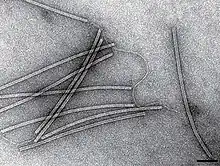| Rudiviridae | |
|---|---|
 | |
| Usarudivirus strain | |
| Virus classification | |
| (unranked): | Virus |
| Realm: | Adnaviria |
| Kingdom: | Zilligvirae |
| Phylum: | Taleaviricota |
| Class: | Tokiviricetes |
| Order: | Ligamenvirales |
| Family: | Rudiviridae |
Rudiviridae is a family of viruses[1] with linear double stranded DNA genomes that infect archaea. The viruses of this family are highly thermostable and can act as a template for site-selective and spatially controlled chemical modification. Furthermore, the two strands of the DNA are covalently linked at both ends of the genomes, which have long inverted terminal repeats.[2] These inverted repeats are an adaptation to stabilize the genome in these extreme environments.[3]
Taxonomy
The following genera are assigned to the family:[1]
- Azorudivirus
- Hoswirudivirus
- Icerudivirus
- Itarudivirus
- Japarudivirus
- Mexirudivirus
- Usarudivirus
References
- 1 2 "Family: Rudiviridae". Virus Taxonomy: 2020 Release. International Committee on Taxonomy of Viruses. March 2021. Retrieved 14 May 2021.
- ↑ King AM, Lefkowitz E, Adams MJ, Carstens EB, eds. (2011-11-10). Virus Taxonomy: Ninth Report of the International Committee on Taxonomy of Viruses. Elsevier. ISBN 978-0-12-384685-3.
- ↑ Silva JM, Pratas D, Caetano T, Matos S (August 2022). "The complexity landscape of viral genomes". GigaScience. 11: giac079. doi:10.1093/gigascience/giac079. PMC 9366995. PMID 35950839.
![]() Media related to Rudiviridae at Wikimedia Commons
Media related to Rudiviridae at Wikimedia Commons
This article is issued from Wikipedia. The text is licensed under Creative Commons - Attribution - Sharealike. Additional terms may apply for the media files.